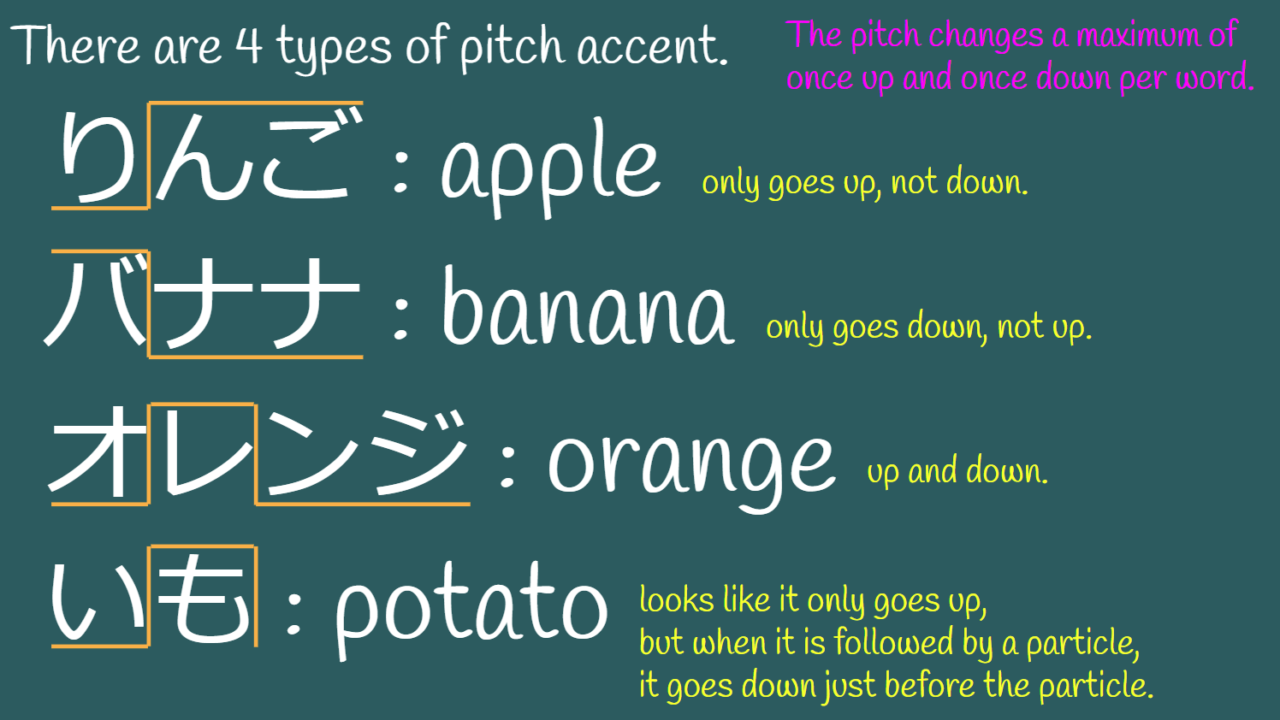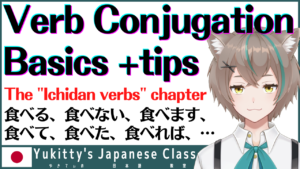

English has a stress accent, which I have a hard time with.
Japanese has a pitch accent instead of a stress accent.
Since this varies from region to region within Japan, I’ll talk about what is used in broadcasts, known as standard Japanese. There are numerous words with the same pitch accent but completely different meanings. But in fact, Japanese people are not that aware of pitch accents and often infer words from context and situation. So, even if the pitch accent is a little wrong, the conversation can still be understood, it feels unnatural, though.
 Yukitty
YukittyI think there are few teaching materials available.
I hope this video will be a useful addition to your teaching materials.





I pronounced them in the above video!
雨が降る: have rainfall
明日は雨でしょう: it will rain tomorrow
飴をなめる: lick candy
レモン味の飴: lemon-flavored candy
鼻がかゆい: itchy nose
花が咲く: flowers bloom
着るものがない: there is nothing to wear
服を着る: wear clothes
切るものがない: there is nothing to cut
にんじんを切る: Cut carrots
梨は高い: pears are expensive
おいしい梨: delicious pear
台無し: spoiled
悔い無し: without regret
味付け: seasoning
味がする: have a taste for
鯵料理: horse mackerel dishes
日本人: Japanese people
日本の食べ物: Japanese food
二本ください: I’ll have two, please
木が二本ある: There are two trees
高いビル: tall building
背が高い: tall (of a person)
他界した: passed away
お客様からの依頼: Customer requests
依頼を受ける: get a request
昨年以来: since last year
明日以外なら空いています: I’m free except tomorrow
意外な結果: surprising results
意外と強い: unexpectedly strong
以上です: that’s all
これ以上: more than this
異常なし: no abnormalities
異常が見つかる: abnormalities are found
公開される: published
近日公開: coming soon
昨日のことで後悔する: I regret what I did yesterday
生涯にわたって: over the course of one’s lifetime
障害が発生する: failures occur
電波障害: radio interference
用意する: prepare
容易ではない: not easy
廃棄する: dispose
排気ガス: exhaust gas
平気です: I’m fine
新兵器: a new weapon
昨日の夜: yesterday night
新機能: new function
機能性重視: focus on functionality
家に帰る: go back home
帰ります: go back
帰らない: don’t back
髪型を変える: change one’s hairstyle
変えます: change
変えない: don’t change
カエル: frog
アマガエル: tree frog
When saying a different kind of frog, “ka” changes to “ga”.
紙を切る: cut paper
髪を切る: cut hair
神に祈る: pray to god
火の神: god of fire
箸を持つ: hold chopsticks
菜箸: long chopsticks
橋を渡る: cross a bridge
つり橋: suspension bridge
端を持つ: have an edge
右端: right edge
八円: eight yen
八百 八個 八本etc. : When saying some kind of eight, “ha” changes to “はっ”.
植木鉢 flower pot
When saying a different kind of bowl or pot, “ha” changes to “ba”.
秋が来る: autumn is coming
空きがある: have a vacancy
空き缶: empty can
飽きる: get bored
飽きない: do not get bored
飽きた: bored
柿を食べる: eat persimmons
牡蠣を食べる: eat oysters
生ガキ: raw oysters
When saying a different kind of oyster, “ka” changes to “ga”.
夏期休暇: summer vacation
北を指す: point to the north
傘を差す: hold an umbrella
串を刺す: skewer
松の木: pine tree
かどまつ: new year’s pine decoration
週末: weekend
月末: end of the month
年末: end of year
待つ: wait
待ちます: wait
待たない: don’t wait
公園に行く: go to the park
運動公園: playfield park
講演をする: give a speech
後援会: supporters” association
今日の運勢は吉だ: Today’s fortune is good
基地の建設予定地: proposed construction site of the base
米軍基地: American military base
既知の事実: known fact
期限が切れる: expire a term
期限切れの: expired
日本の起源: Origins of Japan
機嫌が良い: in a good mood
機嫌をとる: put in a good mood
検討中: under consideration
見当がつかない: having not the slightest idea
健闘した: put up a good fight
各駅停車: a train that stops at every station
各駅に停車する: stops at every station
書く: write
書きます: write(polite)
書かない: don’t write
核となる技術: core technologies
品格: dignity
格が違う: be of a different status
交渉する: negotiate
公称値: nominal value
高尚な趣味: noble hobby
校章を付ける: wear a school badge
Kosho is the word with the most homonyms, with 48 in total, but the others are used so infrequently that only a language geek would know the meaning of all of them, even among Japanese.


この記事が気に入ったら
フォローしてね!
















Comment